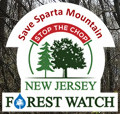
|
|
Credit: New Jersey Forest Watch |
The NJ Forest Task Force commissioned by Senator Bob Smith (Chair of the Senate Environment and Energy Committee) is about to produce its final report and present to a joint legislative session on Feb. 22, 2023. Members of the legislature as well as the public and press need to understand how the task force arrived at its recommendations and the science behind them in order to evaluate them.
In forming the task force Senator Smith stated: “Forests are critical to the environmental welfare of our State. They can play a major role in mitigating climate change by sequestering carbon dioxide; providing habitats for endangered wildlife; helping clean and protect drinking water sources; and stabilizing soils. Proper management of forests is also necessary for preventing wildfires which are becoming more frequent and intense.”[1]
The purpose of the task force was “to study and identify ways in which the State can best manage its [public] forests in order to fight climate change, prevent forest fires, improve ecosystems, and protect soil and water quality.”[2]
A major impetus for creating the task force appeared to be the ongoing mechanized, commercial style logging (clearcutting) on Sparta Mountain of 10+ acres per year since 2011, conducted by the NJDEP in partnership with the NJ Audubon Society. To date, approximately 110 acres have been essentially clearcut on Sparta Mountain.
Among the many issues uncovered by the task force is the fact that there are no state policies codified by statute for management of NJ public forests adopted pursuant to the Administrative Procedure Act. There are also no formal DEP rules and regulations for this purpose. The NJDEP along with partners like NJAS are making public policy with no authorization, very little public input and virtually no oversight.
The task force leaders set two key objectives: 1) develop a process to reach consensus where it was possible and 2) base all recommendations on peer-reviewed science. Consensus was defined as having about 95% of participants in agreement on a topic. Only policies with consensus support were to become recommendations. Proposals backed by peer-reviewed science findings were solicited from participants. After several meetings it was clear that it was going to be very difficult to achieve consensus on almost any topic and the team leaders stated that the science was too deep and complex and the task force did not have the resources to properly evaluate it. Participants created over 75 proposals but only 40 were discussed.
At that point, the leaders changed tactics and asked for a list of any topics on which we might be able to find consensus. This started a less than totally transparent process. First, the random list was aggregated by the leaders into a monolithic all-or-nothing package of elements called the Framework. Participants were asked to vote on accepting or rejecting it in total. Participants were urged by the leaders to support the entire Framework even if they disagreed with portions of it. There were several rounds of votes in November and December (and participants were then also able to vote on individual topics), but the leaders never produced a quantitative report on the support for any elements or the total package. In the last iteration of the Framework, all the previously labeled “elements,” suddenly became “Recommendations,” and now form the basis of the task force output. As of this date, there has been no report demonstrating consensus on any elements in the Framework or the overall document itself, yet it is described by the leaders as “ideas that enjoy broad agreement among diverse Task Force participants.”
While there are a number of good recommendations in the Framework there are also bad recommendations. Most egregious is the late inclusion in the Framework – long after task force meetings had ended and, therefore, without any discussion amongst the participants – of Recommendation 15 which states:
The NJDEP should not include commercial profit as a goal in any forest management plan* on public land. Commercial timber management should not be a goal for any forest management plan on public land. Wood products can be sold in instances where cutting and removal of wood is a necessary part of an approved plan with ecological health, climate, or other non-commercial goals.
*includes Ecological Restoration Plans, Natural Resource Stewardship Plans or other plans on public forested lands
This packages a very good recommendation (disallowing commercial logging) with a very bad recommendation (allowing the sale of wood products from approved logging plans for private gain). This packaging made it impossible for many participants to approve of disallowing commercial logging because the recommendation includes the continuation of the status quo logging, justified through false and misleading claims, as seen on Sparta Mountain. Moreover, the opposition to this DEP program appeared to be a major factor in creating the task force, but has been manipulated, without consensus support, to now be a recommendation.
Space does not permit a thorough explanation of the arguments used to justify the current and future logging program, the lack of data behind recommendations and omissions from the recommendations. Briefly,
- No substantive actions were recommended to fight climate change – the first item on Senator Smith’s list of goals
- Recommendations were not based on any quantification of the existing or necessary increase in carbon sequestration called for in the Global Warming Response Act 2020 Report
- It ignores many studies showing that maturing and mature forests store and sequester more carbon than young forests, which are net emitters of carbon for their first two decades
- Recommendation 15 undercuts efforts to fight climate change by increasing carbon emissions from tree cutting and removal
- Despite acknowledging the open question of DEP legal authority to set policy for public forests and lack of regulations, the task force specifically recommended that existing plans continue to be implemented
- Arguments for the need to increase habitat for certain bird species through logging have been debunked[3]
- There was no consideration of the logging harms to many interior forest bird species, other animals such as amphibians, bobcats and bears and the essential network of mycorrhizal fungi, essential for healthy forests
- There is no science-based evidence that cutting and removing wood has any climate benefits as included as a rationale in Recommendation 15 – the reverse is true
- There was no consideration of the harms caused by mechanized logging
- There was no consideration of any standards for ecological restoration
- There was no review of the scientifically proven ecological benefits of leaving cut wood on the ground to allow its carbon to be sequestered and the absence of need to remove wood for virtually any ecological purpose
- There was no willingness to recognize the scientific basis of proforestation forest management in the Framework
- There were no recommendations on protecting soil and water quality
- There was no discussion of the often-stated need for a moratorium on logging, until regulations are written
In summary, the task force produced no provable consensus, has not followed the science and recommends the status quo on logging public forests for private gain. NJ residents have not paid to preserve their forests in order to generate profit for private entities.
Silvia Solaun, Executive Director, New Jersey Forest Watch
Ken Dolsky, Vice President, New Jersey Forest Watch
[1] https://www.insidernj.com/press-release/smith-announces-formation-forest-stewardship-task-force/
[2] https://www.insidernj.com/press-release/smith-announces-formation-forest-stewardship-task-force/
[3] Kellett, M. J., Maloof, J. E., Masino, S. A., Frelich, L. E., Faison, E. K., Brosi, S. L., and Foster, D. R. (2023). Forest-clearing to create early-successional habitats: Questionable benefits, significant costs. Front. For. Glob. Change. https://doi.org/10.3389/ffgc.2022.1073677


No comments:
Post a Comment
Comments are subject to our Terms of Use